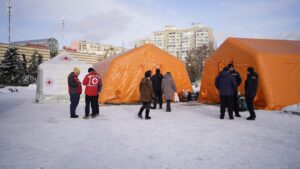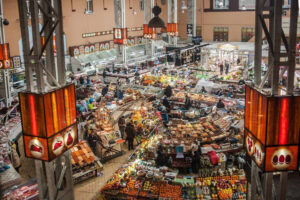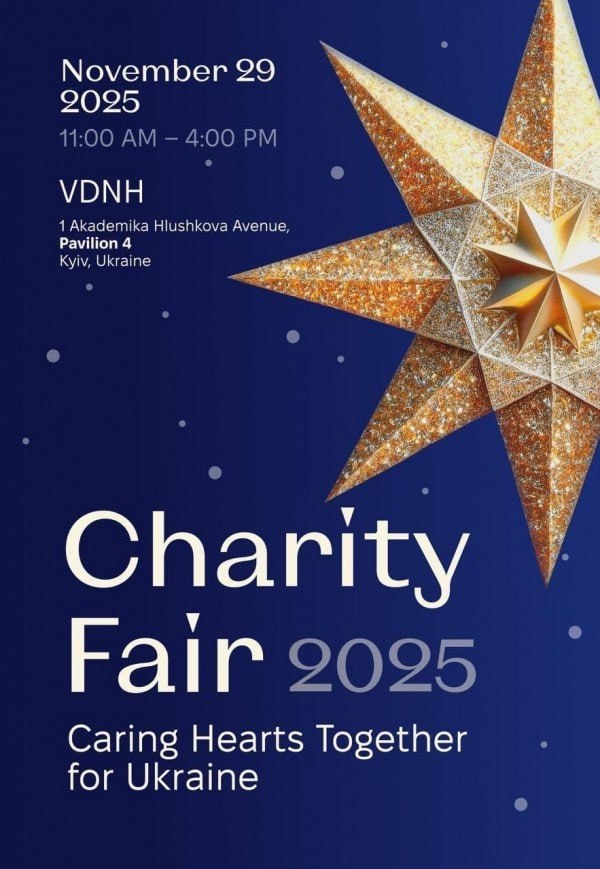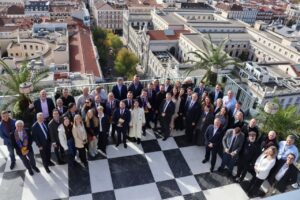
The Ukrainian Red Cross (URC) has set up mobile heating points to support the residents of Kyiv.
“Volunteers from the Ukrainian Red Cross rapid response team, together with rescuers from the State Emergency Service of Ukraine, continue to support Kyiv residents amid damage to a significant part of the energy infrastructure, which has led to a lack of electricity and heat in a large number of homes… Through joint efforts, mobile heating points have been set up where Kyiv residents can warm up, recharge their mobile devices, and receive the necessary support until the stable operation of the power system is restored,” the UCRC reported on Facebook on Sunday.
If necessary, people can also seek initial psychological assistance at the heating points.

The average price on the primary market at the end of 2025 was $2,011 per square meter, or 84,600 UAH per square meter, an increase of 3.3% in dollar terms over the year, according to a press release from City One Development to Interfax-Ukraine.
According to the company’s analytical report, 2025 was a year of quiet recovery without any sharp movements for the primary residential real estate market in Kyiv.
“In fact, the market went through two different phases. At the beginning of the year, demand remained subdued: buyers took a wait-and-see position, which led to a slight (-1.2%) price adjustment. However, the second half of the year showed a change in sentiment – the number of transactions increased, and prices returned to a smooth increase (on average, they rose by 4.5%). As a result, 2025 ended with a moderate (+3.3%) increase,” said City One Development analyst Olena Shirina.
She emphasized that a distinctive feature of 2025 is the significant difference between formal statistics and the real state of the market, since average price indicators remain “burdened” by projects that have been on sale for years but are not actually being built or are in a frozen state. If such objects are excluded from the calculations, the real average price of active new buildings in Kyiv is about $2,140/sq. m, which is approximately 6-7% higher than the official statistics.
As for the structure of supply, only 3% of the supply is economy class. The dominant segment is now comfort, accounting for about 50% of the supply, business class accounts for about 35%, and premium holds a share of 8-10% despite the reduction in the number of projects.
The most significant price dynamics in 2025 were demonstrated by affordable formats, which is logical in conditions of limited effective demand. Economy class rose by 5% to $1,103/sq. m., comfort class by 4% to $1,365/sq. m., business class by 2% to $2,450/sq. m., and premium class by 4% to $4,596/sq. m.
The new supply for 2025 was a record for the capital, given the military conditions. According to City One Development’s monitoring, 10 new residential complexes have entered the Kyiv market since the beginning of the year.
The first half of the year was dominated by large comfort complexes aimed at the mass buyer. The average starting price was $1,428/sq. m.
The second half of the year brought business and premium class projects to the market with higher starting prices and more complex concepts. The average starting price was $2,727/sq. m.
This indicates a gradual return of developers to more complex formats and a resumption of investment interest in the market.
“The total number of residential complexes on the market has decreased by approximately 25% over the four years of the war, creating a shortage of quality supply. Developers are launching new projects cautiously, focusing on solvent demand and investors, with new projects being more expensive than the market average. The number of new residential complexes is significant for the fourth year of the war, but insufficient for a city with a population of over a million — supply will remain limited, and there will be less affordable housing, with competition between developers increasingly based on product rather than price,” says Shyryna.
According to her, if current macroeconomic and security factors remain unchanged, 2026 has all the prerequisites to start with moderate price increases and a subsequent shortage of quality supply. “The market has already passed its lowest point and is gradually entering a growth phase, where the reliability of the developer, a well-thought-out concept, and the long-term value of the project will play a key role,” says Shyrina.
City One Development is an investment and development company with more than 15 years of experience. It specializes in the creation, implementation, and management of large-scale infrastructure residential complexes, as well as actively investing in the development of Ukrainian industry.
City One Development’s portfolio includes more than 1.24 million square meters of completed projects and 500,000 square meters under construction.
The company’s residential projects in the capital include Novopecherski Lypky, Boulevard of Fountains, Svyatobor Park Resort, and The Light. Its industrial projects include two float glass production plants as part of the City of Glass and Galicia industrial parks.

Approximately $3.5 million has been invested in the modernization of the Bessarabsky Market in the capital and the launch of the “Bessarabka. Food Market” project, according to project manager Natalia Dzhuylay.
“The estimated investment in the modernization is about UAH 150 million (approximately $3.5 million at the exchange rate at the time of calculation). More than half of this amount was raised in the form of a loan, the rest — from the project participants’ own funds,” she told the media outlet “Reve ta stogne restaurator” (The Restorer Roars and Moans).
She noted that this project is changing the essence and purpose of the Bessarabsky Market: traders who have worked here for decades are returning to their places and continuing to work in the renovated, but essentially unchanged, shopping arcades.
According to her, the main principle of the food hall concept is that there should be no duplication of formats and menus, and each corner should occupy a unique niche. Contracts with residents are concluded for one year.
“In case of failure to meet the specified financial indicators, we reserve the right to replace the corner. But it is obvious that failure to meet KPIs is primarily unprofitable for the resident itself, as it means a lack of sufficient revenue and traffic. We are interested in each corner working effectively, so in case of a decline, we will analyze the reasons and look for ways to improve,” Dzhuay said.
The project’s Instagram page does not have an opening date, only an announcement that it will happen soon.
“Launching a project requires extensive preparation, coordination, and investment. We had to gather residents, set up retail spaces, and get ready. Some of the work had to be postponed. Ideally, the opening should have taken place in September, but it is more important for us to do everything well, rather than in a hurry. We are not afraid of the winter period — on the contrary, we want traders and restaurateurs to be able to work right now,” she said.
As previously reported by Village, as part of the gastronomic project “Bessarabka. Food Market,” 17 food corners and a separate bar are planned to open at the Bessarabsky Market, with a total of about 400 seats in various formats. Participation in the project “Bessarabka. Food Market” project include Ministry of Desserts, Himalaya, Buffalino, Burger Farm, Glek, Matsoni, Big Mama, Zharovnya, Tatarka, Sushi Icons, Gyros, Gelarty, Vytch, as well as the Cherry Coffee café and bar.
The Bessarabsky Market is one of the oldest covered markets in Ukraine, built at the beginning of the 20th century according to a design by architect Henrik Gay. Its building is a monument of architecture and urban planning of national importance.
Prior to this, in the summer of 2024, renovation work began on the Bessarabsky Market. The Kyiv City State Administration noted at the time that the post-Soviet superstructures were being removed from part of the premises, and the work did not involve any interference with the historical details of the structures. Since May 2025, the market’s refrigeration equipment has been upgraded to reduce energy consumption.

Kyiv retains its status as the most stable location for the development of investment rental projects in Ukraine, according to Alexander Ovcharenko, co-owner of Standard One.
In recent years, domestic investors have focused their attention on the income-generating real estate market, which is rapidly becoming more professional. Various categories of income-generating real estate are offered, from residential properties in Kyiv to resort formats in the Carpathians and Bali. Ovcharenko is confident in the advantages of the capital’s build-to-rent projects (buildings that are created and managed for long-term rental).
“Standard One was the first company to launch a full-fledged residential income property project on the Ukrainian market. When we built our first build-to-rent property, we proved 100% that it can work effectively in our market,“ he emphasized during the discussion ”Income-generating real estate: strategies of leaders“ at the ”Invest Forum: Real Estate,” which took place on November 27 in Kyiv.
According to him, the S1 VDNG project demonstrated a 10% annual return on rent and 48% capitalization during construction. This result, which attracts investors to the company’s subsequent projects, was achieved through a series of measures. A proprietary company was created to manage income-generating real estate, an online platform for leasing was developed, and service standards were developed so that investors receive predictable income and tenants receive comfort and security.
“Our operating company, S1 Property, completely relieves both tenants and investors of all their worries. We have developed our own 24/7 hotel-type service standards,” says Ovcharenko.
The expert noted that quality management is a critical component of a successful business model. That is why Standard One invests in engineering, reliable materials, standardized service, and security, because it is the developer, as the owner of this property, who will have to operate the building and repair it if necessary.
According to its business model, Standard One operates exclusively in the capital and focuses on construction in the most attractive locations for tenants in Kyiv: near the metro, with developed infrastructure and recreational areas. The company offers hotel-level service, convenient property management, ergonomic apartments, energy independence, and security. This creates long-term demand and high occupancy rates. But in general, the demand for rental housing in the capital has not decreased and continues to show steady growth.
“Today, we have almost zero vacancy, with 99% occupancy. And our format does not involve seasonality: people need to live in autumn, summer, and winter,” he says.
One of the key market trends is REIT (Real Estate Investment Trust). “Thanks to REIT, you can invest in income-generating residential real estate without buying an apartment. For 122,000 hryvnia, you can get the same return as the owner of an entire apartment. And it will bring a stable income. This is not a hypothesis, it is a fact. The results of our S1 REIT are better than we expected. Today, it is 8.4% in currency,” said Ovcharenko.
As for development plans, the network of income-generating buildings is currently being expanded, with three new projects in the implementation stage. S1 Obolon and S1 Poznyaki will operate according to the standard build-to-rent model, while S1 Terminal will have serviced apartments for short-stay/mid-stay needs (short-term and medium-term rentals). In addition, the company plans to launch a REIT in the future, in which the fund will own an entire building.
Standard One (S1) is a full-cycle development company that has been developing the income-generating (build-to-rent) real estate segment in Kyiv since 2016. Its portfolio includes the completed S1 VDNG project and the new S1 Obolon, S1 Terminal, S1 Nyvky, and S1 Poznyaki buildings.

The annual Charity Fair 2025, traditionally organized by the Association of Ukrainian Diplomats’ Spouses with the support of the Ministry of Foreign Affairs of Ukraine, took place in Kyiv on Saturday.
According to a correspondent from Interfax-Ukraine, this year’s event was attended by representatives of diplomatic missions from 29 countries, who presented their national traditions and culture. Ukrainian artists, traditional craftsmen, craft producers, designers, and public organizations also joined the joint charity initiative.

The event was personally attended by Ukrainian Foreign Minister Andriy Sibiga and his wife Tetyana Sibiga, who is a co-founder of the Association of Spouses of Ukrainian Diplomats.
As noted by the Ministry of Foreign Affairs, all funds raised will be used for charitable purposes, in particular: the purchase of chemical warmers for military personnel as part of the “Warm the Defender” project; support for internally displaced children; assistance to children and people with disabilities; support for the elderly; assistance to animal shelters; other joint projects of the Association of Spouses of Ukrainian Diplomats, the Club of Spouses of Ambassadors in Kyiv, and the IWCK.
Guests had the opportunity to purchase holiday gifts or create them together with their children at themed master classes.
Each ticket purchase counts as a charitable contribution to the total Charity Fair 2025 collection.
CHARITY, Charity Fair 2025, Christmas fair, KYIV, Spouses of Ukrainian Diplomats

Kyiv enterprises, with the support of the Department of Industry and Entrepreneurship Development of the Kyiv City State Administration, represented the capital of Ukraine at the MATELEC 2025 international exhibition of electrical engineering and electronics, which took place from November 18 to 20, 2025, in Madrid.
Ten Kyiv companies presented their developments at the “Made in Kyiv” stand:
On November 18, the grand opening of the Made in Kyiv collective stand took place, bringing together leading companies from the capital and serving as a platform for demonstrating innovative solutions in the fields of electronics, energy, automation, and modern manufacturing.
The opening ceremony was attended by representatives of government and diplomatic institutions, including Oksana Skrypets, Minister-Counselor of the Embassy of Ukraine in Spain, Rada Ivanova, representative of the Madrid Chamber of Commerce, Volodymyr Kostikov, Director of the Department of Industry and Entrepreneurship Development of the Kyiv City State Administration, and his deputy Anatoliy Bahan.
From the very first day of the exhibition, Kyiv-based companies began active negotiations with European partners, demonstrating the high technological level of their products and solutions. At the exhibition stand, companies presented their solutions and devices for measurement and control, software products for process management, telemetry and communication equipment, lighting and power supply systems.
Ukrainian-Spanish Business Forum: New Vectors of Partnership
On November 19, as part of Kyiv’s participation in MATELEC 2025, the Ukrainian-Spanish Business Forum was held, which became an important event for the development of bilateral economic cooperation. The forum brought together representatives of industry, energy, automation, and high technology from Ukraine and Spain, becoming an effective platform for B2B communications.
Among the participants and speakers at the forum were representatives of the Embassy of Ukraine in Spain, SERCOBE, the Ukrainian-Spanish Chamber of Commerce, Rotary Club Madrid, CEIM, and the Madrid Chamber of Commerce and Industry.
During the event, Deputy Director of the Department Anatoliy Bahan presented the catalog “Best Exporter of the Year 2025,” and a Memorandum of Cooperation was signed between the Department of Industry and Entrepreneurship Development of the Kyiv City State Administration and Rotary Club Madrid International Passport, opening up new opportunities for international cooperation.
As a result of the forum, more than 70 individual business meetings were held, and the prospects for joint projects, distribution, and production cooperation were discussed.
“This forum was not just an event for us, but an important signal that Kyiv enterprises remain competitive in the European market. The dynamics of the negotiations and the sincere interest of Spanish partners in our engineering solutions are impressive. We see a real demand from Spanish businesses for cooperation with Kyiv, and this is the best evidence of the effectiveness of our work,” said Department Director Volodymyr Kostikov.
Overall, Spanish and European companies highly appreciated the innovation, engineering culture, and product quality of Kyiv enterprises, and Kyiv’s participation in the MATELEC 2025 exhibition was a striking example of effective international presence, demonstrating the capital’s investment attractiveness and the consistent development of the export potential of Kyiv businesses.
“We are not only presenting our capabilities — we are building trust, forming partnerships, and opening the way to new markets for our enterprises. Participation in MATELEC 2025 confirms that Kyiv’s industry has powerful potential and is capable of competing at the European level,” summed up Volodymyr Kostikov.
Interfax-Ukraine is a media partner of the event.